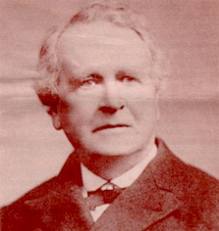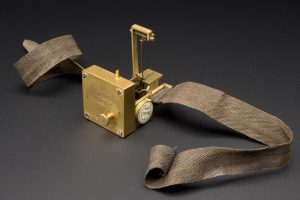 Robert Ellis Dudgeon MD LRCSE (17 March 1820 – 8 September 1904), studied in Paris and Vienna before graduating as a doctor. Dudgeon then became the first editor of the British Journal of Homeopathy and he held this post for almost forty years until its cessation in 1884.
Robert Ellis Dudgeon MD LRCSE (17 March 1820 – 8 September 1904), studied in Paris and Vienna before graduating as a doctor. Dudgeon then became the first editor of the British Journal of Homeopathy and he held this post for almost forty years until its cessation in 1884.
In the early days of English homeopathy he was extremely important both as a teacher and as a translator of Hahnemann’s works into English. He was based in London. He was arguably the most important of the early homeopaths in England, second only after Dr Quin.
Dudgeon was a committee member and Honorary Secretary of the Association for the Protection of Homeopathic Students and Practitioners.
Robert Ellis Dudgeon was born in Leith, Scotland, to a wealthy timber merchant and ship owner. He entered Edinburgh University as a boy and by 19 had passed all of his examinations for the MD, qualifying with the Royal College of Surgery (Edinburgh) in 1839. However, as he was not yet of age he had to wait for the conferral of his doctorate, Dudgeon spent those intervening two years studying at École de Médecine de Paris and the hospitals there, attending lectures and clinical practice of Velpeau, Andral, Civiale, Maisonneuve, Louis, Piorry and others. During this time he also visited Vienna.
Dudgeon returned to Edinburgh in 1841 to complete his final examinations and on 1 August was awarded his MD. Shortly after he spent a further semester in Vienna, studying with Skoda, Rokitanksy, Hebra, Heller, and Jaeger.
While in Vienna, Dudgeon met several other British homeopaths, John James Drysdale, John Rutherfurd Russell and the Canadian Arthur Fisher, who were studying homeopathy at Fleischmann‘s Gumpendorf Homoeopathic Hospital. He also became friends with another visiting student, the future Sir William Wilde, who would become a noted Dublin ophthalmologic surgeon and father of the playwright Oscar Wilde. Although not an homeopath, Wilde senior observed firsthand the astonishing success of Fleischmann’s treatment of pneumonia patients and included a short defense of homeopathy in his 1843 book, Austria: Its Literary, Scientific, and Medical Institutions.
Despite all this Dudgeon remained uninterested in Hahnemann’s system and proceeded to Berlin for further study of the eye under Jüngken, of the ear under Kramer, and organic chemistry under Simon. He also went to Dublin to listen to Graves, Stokes, Corrigan, and Marsh.
Dudgeon returned to England in 1843 and set up in practice in Liverpool, where his colleague Drysdale also practiced. That year Drysdale, along with John Rutherford Russell and Francis Black, had founded the British Journal of Homoeopathy, and asked Dudgeon to help translate German texts for the journal. Dudgeon obliged his friends and, in the process of translating, became a convert to homeopathy.
On Drysdale’s advice Dudgeon returned to Vienna where he took instruction from Fleischmann at the Gumpendorf Hospital, alongside fellow students Henry R. Madden, George James Hilbers, and the hydropath William Macleod.
Dudgeon and Madden lived together with their wives in Vienna and devoted their free time to studying the materia medica. Dudgeon also made the acquaintance of all of the notable Viennese homeopaths, namely Wurmb, Watzke, Gerstel, Zlatarovich, Nehrer, from whom he learned much. As Dudgeon later recalled:
At that time Vienna was in the heyday of its homoeopathic fervor, and a vast deal of invaluable work was done in the way of proving new medicines and re-proving old ones. Many useful essays were also published in the periodicals edited by the homoeopathic society….While their zeal lasted we must allow that they did splendid work.
In 1845, Dudgeon returned to England and set up in private practice in London. The following year he joined Drysdale and Rutherford Russell in editing the fourth volume of the British Journal of Homoeopathy. Dudgeon would remain the sole member of this trio to continue with the journal until it ceased publication in 1884.
In 1850, Dudgeon helped found the London Hahnemann Hospital, with which was connected the Hahnemann Medical Society Dudgeon sat on the council of the Hahnemann Medical Society and would also serve as its Honorary Secretary in 1850-1. He also became Secretary of the British Homeopathic Society in 1848, its Treasurer from 1883-1893, and President in 1878 and 1890.
Dudgeon was personally invested in the well-being of the homeopathic medical community, as was evident in January 1889 when he was one of young homeopath Henri Eugene Husson‘s attendants during his final illness, alongside William Bradshaw and John Henry Clarke.
Dudgeon practiced as consultant surgeon at the London Homeopathic Hospital and specialised in Optics, writing prodigiously on the subject, even inventing “subaqueous spectacles” which could be used under water.

Sphygmograph which belonged to Dudgeon, 1876. https://collection.sciencemuseumgroup.org.uk
In 1881 Dudgeon invented a portable Sphygmograph.This was an improvement on the first portable Sphygmograph that had been designed by Étienne-Jules Marey in 1863.
It was made by instrument maker J. Gauter in 1876. In the late 1800s, physiology teachers used sphygmographs to visually demonstrate blood pressure. Instruments such as this were also valuable diagnostic aids. They were the predecessor of the modern arm cuffs physicians now use to measure blood pressure…’
Dudgeon’s sphygmograph was strapped to the wrist. The pulse at the wrist caused a metal strip to move a stylus, transmitting a record of the pulse onto smoked paper.
Dudgeon’s instrument quickly became popular since it was compact and easy to use. The sphygmograph traces an undulating line, which represents a record of blood pressure and pulse over time.
As an homeopath, Dudgeon was a low-potency prescriber like Richard Hughes, with whom he was always associated.
Like Hughes, he was opposed to the higher potencies “on principle,” which at that time was practically everything above 6x, and to the indiscriminate use of nosodes and unproven remedies. He sought justification for these views from Samuel Hahnemann, who never promoted the use of high potencies, even though he made use of them occasionally.
Robert Ellis Dudgeon died before any of the information about Samuel Hahnemann‘s later work was published in 1922. Yet as a translator of German works, Dudgeon must have been aware of Hahnemann’s use of liquid doses, centesimals, LM’s and serial dilution in water, techniques which were all brought in with the 5th Edition of the Organon in the 1830’s.
Perhaps Robert Ellis Dudgeon conveniently chose to ignore these developments as a ‘temporary deviational experiment’ on Samuel Hahnemann‘s part. We simply do not know what Robert Ellis Dudgeon made of that. But as an ardent ‘3xer’ he would never have used such techniques and would certainly have regarded them with a derisive scepticism.
Dudgeon was also active as a public health reformer, promoting temperance, hygiene and the benefits of exercise on public health. He was a strenuous advocate of swimming, endorsing the construction of public swimming baths, and in 1870 he published an overview on the subject, The Swimming Baths of London. He was also a committed anti-vivisectionist, basing his opposition to it on the unscientific nature of vivisection, rather than emotive appeals to conscience.
Dudgeon’s final book The Prolongation of Life was written when he was 82 years of age and published in 1900, two years before his death.
In addition to his medical work, Dudgeon was a close friend of Samuel Butler, the author of Erewhon, who may have influenced Dudgeon to write his 1873 novel Colymbia, a fantasy set under the sea.
But above all it was Dudgeon’s ceaseless dedication to homeopathy that earned him admiration and respect, even from the editors of the British Medical Journal. Dudgeon advocated for homeopathy throughout his professional life and emphasized the need to reach out to the general public. To that end he anonymously authored 38 out of 40 tracts on the subject, issued by the Homoeopathic League, to increase awareness of homeopathy.
In 1882-3, Dudgeon was a Council Member of the British Homeopathic Society, alongside Hugh Cameron, William Valancey Drury, Robert Douglas Hale, Edward Hamilton, Richard Hughes, John Hamilton Mackechnie, Henry Ridewood Madden, James Bell Metcalfe, Alfred Crosby Pope, Charles Ransford, George Wyld and Stephen Yeldham.
In 1902, a new British Homoeopathic Association was launched with Dudgeon’s blessing as successor to the public outreach efforts of the Homoeopathic League. In an article, “The Twentieth Century Fund,” written in support of these endeavors in the February 1902 edition of the Homeopathic World, Dudgeon acknowledged that although he would be unable to participate in these new outreach efforts, he remained “as zealous as ever for the promotion of the interests of homeopathy and the spread of its beneficial practice among those who required the aid of the physician.”
A year before he died Dudgeon’s sense of humour was vividly demonstrated in the form of a self-penned obituary he sent to the editors of the Monthly Homoeopathic Review with instructions to hold until needed. This was published the following year
The leading characteristic of his life is that he was always on the minority side in all important questions, and that deliberately and intentionally, for he thought that truth, which he loved, was at first always in a minority, and that as soon as it became a majority, it ceased to be interesting.
Though much engaged in medical polemics, he never made an enemy, or if he did, they all died before him, so that at his death he was unable to exercise the Christian virtue of forgiving his enemies, but he could practice the higher virtue of loving them, as they contributed so greatly to his enjoyment of life.”
Robert Ellis Dudgeon died in London on 8 September, 1904 and was cremated at Golders Hill.
Select Publications:
- Pathogenetic Cyclopaedia (1839)
- Cure of Pannus by Innoculation (1844)
- London and Edinburgh Journal of Medical Science (1844)
- Hahnemann’s Therapeutic Hints (1847)
- Homeopathic Treatment and Prevention of Asiatic Cholera (1847)
- Hahnemann’s Organon (1849)
- Hahnemann’s Lesser Writings (1852)
- Lectures on the Theory & Practice of Homeopathy (1853)
- On Subaqueous Vision, Philosophical Magazine (1871)
- The Influence of Homeopathy on General Medical Practice Since the Death of Hahnemann (1874)
- Repertory of the Homeopathic Materia Medica, 2 vols (1878-81)
- The Human Eye Its Optical Construction (1878)
- Hahnemann’s Materia Medica Pura (1880)
- Hahnemann the Founder of Scientific Therapeutics (1882)
- The Sphygmograph (1882)
- Materia Medica: Physiological and Applied with John James Drysdale, John William Hayward, Richard Hughes (1884)
- Medical Boycotting (1886)
- Hahnemann’s Organon (1893) 5th Edition
- The Prolongation of Life (1900)
- Experiments on Human Beings – Vivisection Up to Date – Loathsome Diseases (posthumous, 1911)


I was preparing pioneers from exam point of view , but found here quiet motivating, informative. Given in quiet elobarated way.
Thank you,
Charmi,
MD (Org) Final year student.
8th sept. 2013